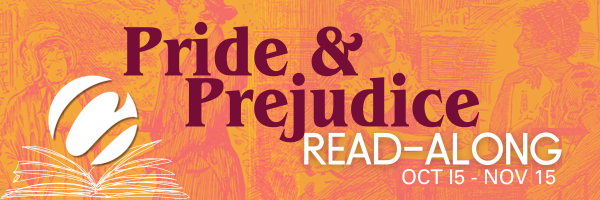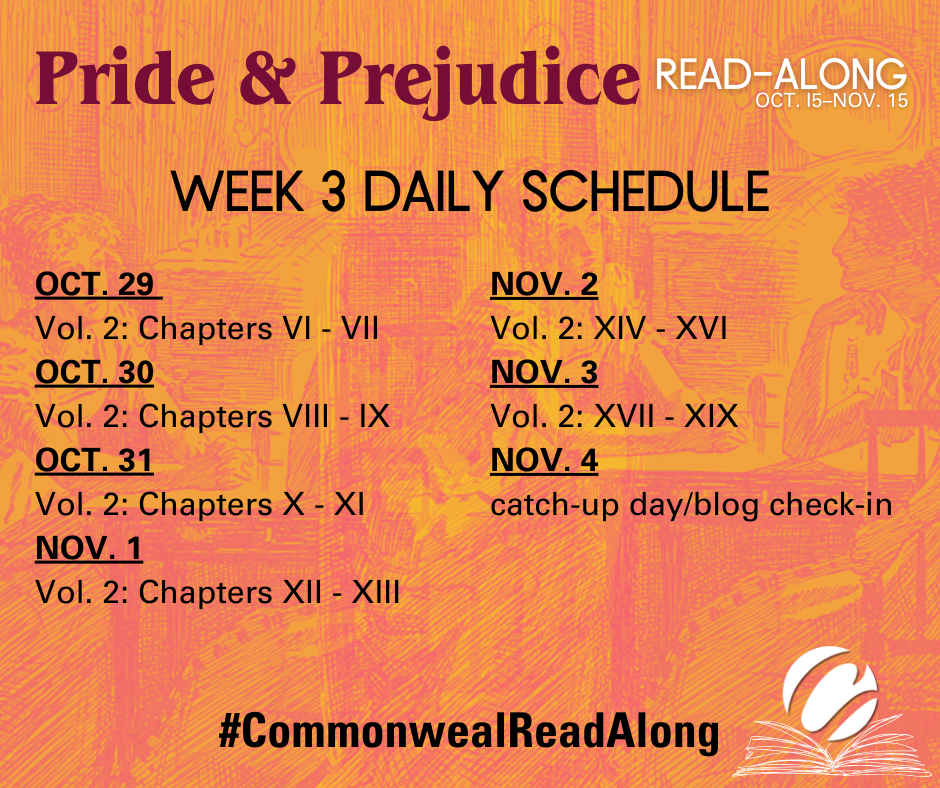
WEEK 2 REFLECTIONS

I’m experimenting with the format here. This is going to be a bit longer, and more of a play-by-play reaction as I go.
Chapter XVI – aka Lizzy’s Crushing Hard On Wickham
Not only is he attractive, but he’s courteous, well-mannered, and a wonderful conversationalist.
And he confirms Lizzy’s prejudice against Darcy with all kinds of details. This is monumental.
“Whatever he said, was said well; and whatever he did, done gracefully. Elizabeth went away with her head full of him. She could think of nothing but of Mr. Wickham, and of what he had told her, all the way home”
I also want to point out a significant plot development (I suspect) is brewing: the daughter of Lady Catherine de Bourgh “will have a very large fortune.” And there is the not-so-subtle hint that Rosings and Pemberley will be united. We can’t forget that nugget, can we?
We also get more elaborations on pride and the different kinds of pride that exist that are wholly noble (in Wickham’s mind, anyway).
Chapter XVII – Anticipation! The Netherfield Ball is Nigh!
Excitement abounds! The other piece of intrigue is Lizzy now understands that Mr. Collins may be seeking her in marriage, but she won’t entertain that line of thinking until he says it for himself.
So far in this book, the youngest daughters Lydia and Kitty are characterized as almost one entity. I’m not criticizing, necessarily, just observing that they are boy-crazy, especially with those soldiers.
This bit from Mary about the impending ball made me smile:
“While I can have my mornings to myself…it is enough. I think it no sacrifice to join occasionally in evening engagements. Society has claims on us all; and I profess myself one of those who consider intervals of recreation and amusement as desirable for every body.”
Chapter XVII – Dancing with Darcy and Trying not to Die of Embarrassment from Other Relations
This is the Main Event!
First of all, I don’t laugh out loud when I read all that much, but when Lizzy “danced” with Mr. Collins, I did:
“The two first dances, however, brought a return of distress; they were dances of mortification. Mr. Collins, awkward and solemn, apologising instead of attending, and often moving wrong without being aware of it, gave her all the shame and misery which a disagreeable partner for a couple of dances can give. The moment of her release from him was ecstasy.”
I think “Dances of Mortification” would make a good album title.
A recurring motif for Austen is noting when Darcy smiles. He does at least twice in this chapter and has done so earlier. I have this impression (built up from collective cultural swooning) that he’s a stone cold gargoyle, but that’s not quite right. And even though we spend the most time in Lizzy’s point of view, we get a sentence like the following:
“For in Darcy’s breast there was a tolerable powerful feeling towards her, which soon procured her pardon, and directed all his anger against another.”
Oh my goodness, there’s a bit toward the end when Mary starts singing, and it’s painted as the most painful karaoke takeover possible. But this along with a collection of other events and mannerisms have larger implications. The Bennets (and Mr. Collins) are all guests at this huge private party, and there’s a sense (from Lizzy) that they are pulling focus, possibly jeopardizing any chance of Jane and Mr. Bingley to secure a match.
Though, it does seem like a done deal, doesn’t it? Jane and Mr. Bingley have eyes only for each other. It’s very sweet.
One final thought on this chapter: Because of that aforementioned cultural swooning of Darcy and working on dialects for Miss Bennet: Christmas at Pemberley, I know who is married to whom at the end of this book. Those matches are “spoiled” for me. And I was a little worried that my knowledge of those matches would impede my enjoyment of reading this book. However, it was this Netherfield Ball chapter that sealed the deal, for me, that the twisting journey of how and when we get to those supposed “happily ever afters” is going to be the remaining fun.
Chapters XIX – XXIII – Mr. Collins Proposes (Twice)
Mr. Collins is, to put it mildly, a windbag. In my edition, his proposal to Lizzy goes on for a whole page in a single paragraph. Then Austen gives the following its own paragraph: “It was absolutely necessary to interrupt him.” I can see how it’s easy to think of Collins as a meddlesome, buzzing fly who won’t go away, but there is a bout of rationality in his argument. Marriage is a financial concern. And he wants to keep his fortune and the estate with the Bennets (or appears to).
Anyway, he ends up proposing to Charlotte Lucas. We haven’t spent a lot of time with her. (There are lots of characters flitting in and around, aren’t there?)
Here’s what we learn about Charlotte:
“Without thinking highly either of men or of matrimony, marriage had always been her object; it was the only honourable provision for well-educated young women of small fortune, and however uncertain of giving happiness, must be their pleasantest preservative from want.” YIKES. But that’s Regency Society, for you!
I’m afraid to report there is now doubt about the Bingley/Jane union. Even Lizzy (privately) believes so.
I loved what Lizzy had to say about weighing personal happiness against that of friends and family:
JANE: “But, my dear sister, can I be happy, even supposing the best, in accepting a man whose sisters and friends are all wishing him to marry elsewhere?”
LIZZY: “You must decide for yourself, and if upon mature deliberation, you find that the misery of disobliging his two sisters is more than equivalent to the happiness of being his wife, I advise you by all means to refuse him.”
This wraps up the end of Volume 1. There’s a sour malaise at Longbourn.
VOLUME 2: Chapters I – V Jane Goes to London and Lizzy Is Sick of All Men
Confession time: I usually read in the mornings, but I wanted to stay on top of the reading and other Commonweal work, so I decided to read this particular chunk of chapters in one sitting, later in the day. There were some occasions when my focus and comprehension were slipping. I am not too proud to say I went over to Sparknotes and got a handle on the goings on. It’s all cleared up. Whew!
My main confusion centered on the Wickham developments. I think my main quibble here is I get tripped up on who folks are talking about sometimes. This Miss King (the young woman who has caught Wickham’s eye) popped out of nowhere, it seems! Did I miss something previously? I’m all squared away, now, thanks to some help (I’m trying, in general, to avoid summaries and blog posts and analysis from others right now–trying to keep this reading as “pure” as possible. I’ll dive into reviews and analysis when I’m done).
It’s also worth noting that Wickham–for all his appeal–does not have a lot of money. So Lizzy’s Aunt Gardiner (wisely?) advises that he’s not worth pursuing.
Lizzy’s own prejudice about Charlotte being doomed for unhappiness with Mr. Collins is tested on her visit to the Hunsford parsonage. Interesting. Interesting. Maybe this match is okay? (I’m so curious about Charlotte and Mr. Collins because I have a friend who wrote a play about Charlotte, and I cannot wait to check it out).
The plot has me a bit more on eggshells now. The book, up until these later chapters, has been relatively bouncy and joyful. Jane Austen knows how to twist and turn. She does it on a sentence level and on a larger scale. It’s fascinating. I’m worried about this Jane and Bingley plot (Bingley’s sisters are wretched, aren’t they?! But will my own prejudice over them be challenged? I’m not sure!).
I think I’ll leave it at that for now.
Here’s this week’s schedule if you’re following along. Read all the way through the second volume.

A couple more things.
- I found this at a store the other day: Pride and Prejudice in Space by Alex Lampley. It has lots of graphics and illustrations sprinkled throughout.

2. I’ve been listening to this playlist on Spotify while I read. It’s wonderful. I’m sure YouTube has a host of Regency-era playlists too.
Happy reading, everyone!



